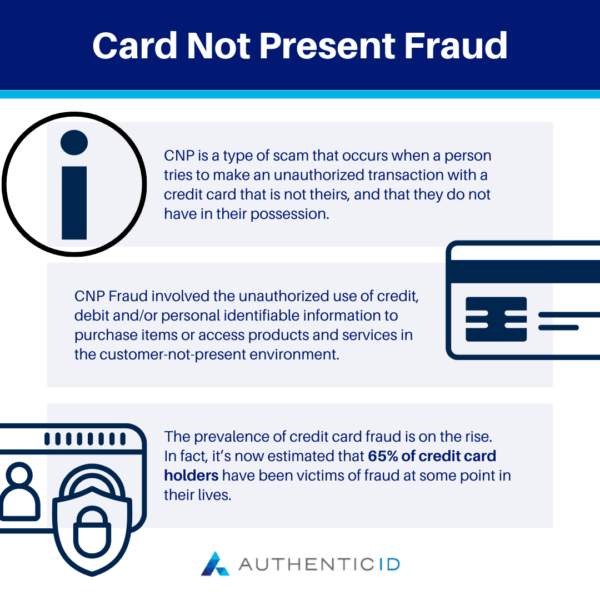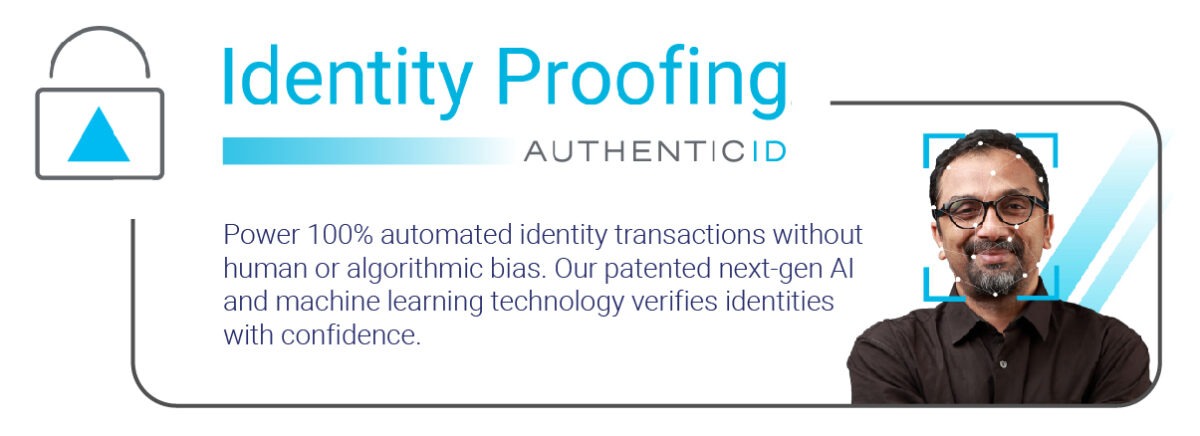The prevalence of credit card fraud is on the rise. In fact, it’s now estimated that 65% of credit card holders have been victims of fraud at some point in their lives. At the same time, online shopping is becoming more commonplace, and individuals no longer have to present a physical card to a merchant to make a transaction. In turn, this creates further opportunities for fraudulent activity.
Though it’s not always easy to detect when credit card fraud is occurring, you should be aware of some of the specific types that can occur–like Card Not Present Fraud.
What is Card Not Present Fraud?
Card Not Present Fraud is a type of scam that occurs when a person tries to make an unauthorized transaction with a credit card that is not theirs, and that they do not have in their possession.
In other words, the fraudster attempts to make a transaction knowing just the numbers of the credit card–typically over the phone or online.
How Does Card Not Present Fraud Work?
For this fraud to occur, the scammer typically needs to come into possession of a stolen credit card number and the cardholder’s name at minimum. Additional details like the billing address associated with the card, the expiration date, and the CVV code are all further pieces of information that they may need to know to make an online purchase with the stolen card details.
These details can be compromised electronically, like through phishing or social engineering scams where the rightful cardholder will unknowingly divulge their credit card information to scammers. This stolen credit card information may be sold on the dark web to other fraudsters to use.
A merchant’s database may also be hacked to reveal the credit card details of their customers, though this is less common. Fraudsters can also get these details if a cardholder leaves their credit card in plain view or provides their credit card details over the phone while out in public. In other cases, a dishonest employee of an establishment may steal a customer’s credit card information for their own personal use with Card Not Present Fraud.
As one could assume, Card Not Present Fraud is primarily done via online or over-the-phone transactions rather than in person where they would need to present the card. So, once the fraudster has the stolen credit card information, they can simply input the details into the appropriate fields on an online storefront as they would with their own card details. For this reason, the more information they can gather outside of just the credit card number, like the CVV or the billing zip code, the better chances they’ll have of being successful at the scam.

What are the Risks of Card Not Present Fraud?
Cardholders, online merchants, and credit card companies themselves may all face consequences in the case of Card Not Present Fraud. Here are some of the biggest risks that each of these groups are subject to with this type of scam.
1. Financial Loss
Credit card issuers may face financial loss in the case of Card Not Present Fraud. Depending on their terms of service, they may be liable for reimbursing cardholders in the amount of the fraudulent charges. Cardholders themselves may be liable for the unauthorized charges if their card issuer will not pay them back.
Card Not Present risk can be combined with other types of scams like chargeback fraud, to further the financial losses of the merchant. Plus, merchants and card issuing companies may incur higher operating costs by implementing more robust security measures and fraud detection programs.
2. Loss of Trust
Cardholders may lose some of their trust in their card issuer if they are subject to Card Not Present Fraud. Modern consumers expect robust security measures in the digital age. So, if a card issuing company cannot provide this, it may lead to customer churn and loss of business as a result.
These companies’ reputations can be eroded with a negative security incident like this, which can impact their operations for years.
3. Credit Score Impact
If a cardholder’s credit card is being used without their knowledge, they may get behind on payments or see their credit usage surge, both of which can negatively impact their credit score. Even if the Card Not Present Fraud is proven, it can be difficult or even impossible to remove these events from your credit report.
Preventing & Detecting Card Not Present Fraud
There are things that both merchants and credit card holders can do to help prevent and mitigate Card Not Present Fraud. This type of fraud is multi-faceted and affects many different stakeholders, so it’s important to utilize a comprehensive strategy to help mitigate this risk from all angles.
- Mailing Address Verification: Online merchants/credit card companies can ask the purchaser to verify the billing address associated with the credit card before confirming the transaction
- CVV Verification: Merchants can require the purchaser to verify the CVV code on the back of the credit card to ensure they have the physical card present with them
- Behavior Tracking: Credit card issuing companies may monitor the regular behavior of a cardholder, hoping to catch or detect any unusual transactions based on frequency, amount, location, etc.
- Biometric Verification: Card issuers may utilize biometric verification like fingerprint scanning or voice recognition to help prevent any unauthorized use of the credit card
- Safeguarding Personal Data: Cardholders need to keep their sensitive personal information secure and out of reach from potential fraudsters; only enter credit card details into websites you’re familiar with or disclose the information over the phone to trusted parties
- Set up Transaction Alerts: Cardholders can set up notifications with their card issuer to be alerted each time there’s been a transaction using their card
- Set Transaction Limits: Card issuers can set transaction limits on each account to help prevent the extent of the financial damage should the credit card details end up in the wrong hands

